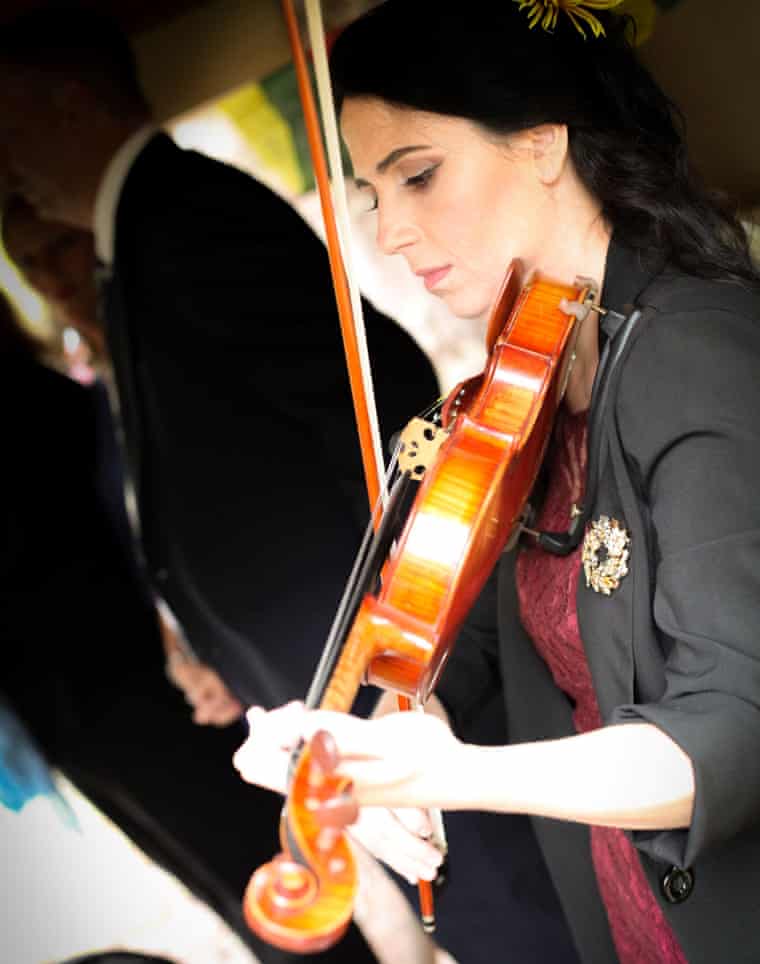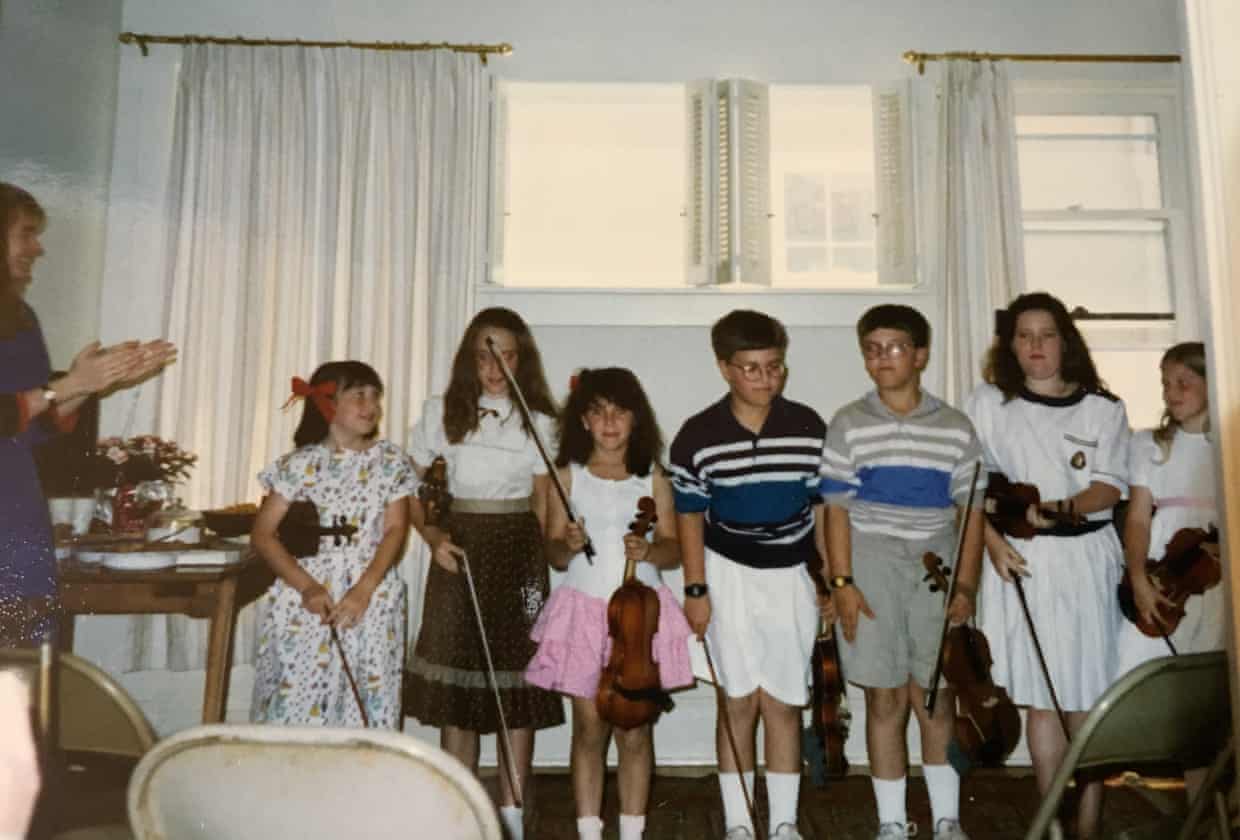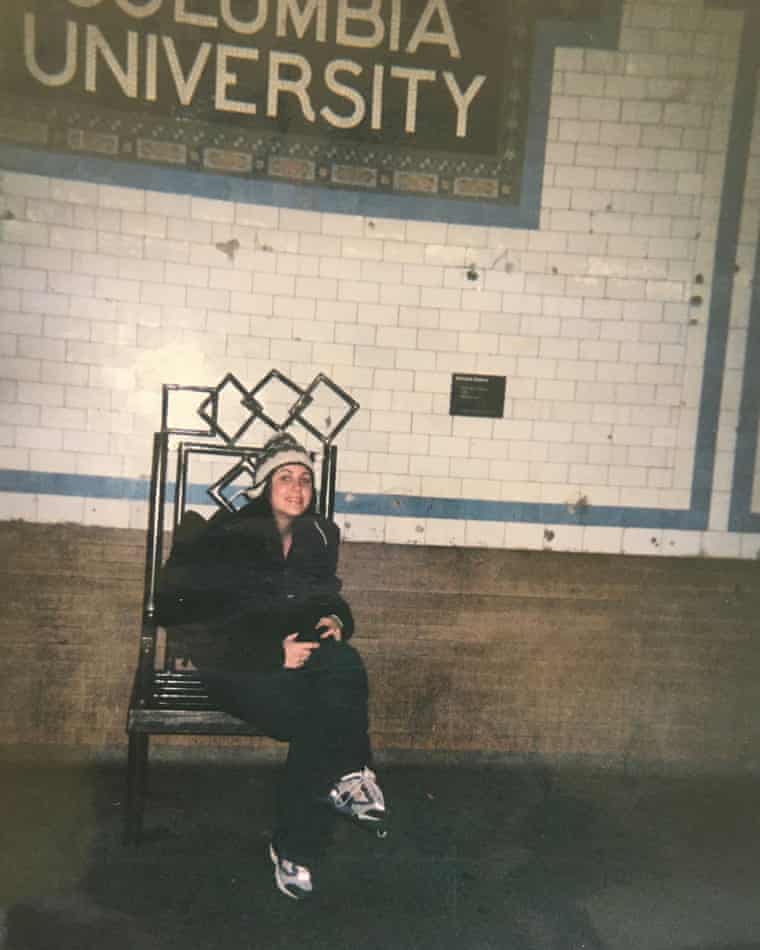
Autobiography and memoir
'Milli Violini': I was a fake violinist in a world-class miming orchestra
Jessica Chiccehitto Hindman spent years touring America in an orchestra of gifted players who mimed to CDs. She relives their bizarre performances – and her eventual collapse
by Sian CainA young violinist joins an award-winning ensemble led by a famous composer, only to find out that all of the musicians aren’t actually playing their instruments but are simply miming along to a CD instead. It is an incredible premise for a memoir, and might even make a great Coen brothers film, but Jessica Chiccehitto Hindman says this astonishing story happened to her.
At 21, she found herself alone in New York, working two jobs and selling her own eggs to fund her way through Columbia University, where she was studying to be a war correspondent. Hindman finally caught a break in 2002, one that allowed her to monetise her talent as a violinist. She was hired to play in an orchestra by a man she calls only The Composer. But she says she quickly realised the truth: she was to “play” in front of a dead microphone beneath a booming CD player, and her audiences, whether in a concert hall or a shopping mall, would never twig. “Sounds like Titanic!” someone gushed after one gig. The music did sound a little like the film’s soundtrack, and the line gave Hindman the title of her memoir. She did this job for four years. She was, as she writes, Milli Violini.
Performing under a backing track is not illegal, as everyone from Beyoncé to Yo-Yo Ma knows. And The Composer, who has sold millions of records and performed in New York’s Carnegie Hall, is no evil genius. He is often generous, talking to his fans for hours after shows. His tours have raised millions for charities. But he is also an exploitative boss, she says, and surprisingly ignorant. When Hindman puts Beethoven’s Fifth Symphony on in their rickety tour bus, he says: “I like this music. What is it?”

“It was a gentler, kinder scam,” says Hindman, who is now 39, with a laugh, “almost as if the Fyre festival had been for charity and everyone had enjoyed themselves. I think it is much more widespread than people understand. It is funny how outraged people get. Even the word ‘scam’ implies he was motivated by money, and I don’t think he was. He was motivated by the desire to be famous and praised, to be seen as a very good person, and I love that so much more. But it can lead you down a dark path, to the point that you turn off microphones in front of really good musicians because you are so obsessed with perfection.”
With the ensemble, Hindman says, she travelled up and down the country, playing eight hours straight at booths selling The Composer’s CDs. In 2004, she joined him on a three-month tour across 54 cities, playing in packed concert halls in front of footage of a bald eagle. Despite such close proximity, The Composer frequently calls Jessica “Melissa”. He only eats Cap’n Crunch cereal and apples, and no food after noon. He rarely touches an instrument, and spends his days writing a Christian musical. He asks questions like: “What is Barcelona?”
He demands unity from his musicians, buying them all matching jackets, and starts each show by asking them to smile more. During one concert, Hindman studies his face, twisted in a rictus as he waltzes with an audience member he has pulled on stage, and realises that he doesn’t resemble a celebrity as she had first thought – he looks like a velociraptor from Jurassic Park.
The Composer wanted the musicians to mime, Hindman says, because that way “we sounded perfect, never had to rehearse and he could switch us up like socks”. The musicians, some of whom had PhDs from Juilliard, accepted it because, like Hindman, they couldn’t find full-time work and needed the money. “I was the least qualified person in the ensemble,” she says. “That’s what made it so silly. He had these world-class musicians and he wasn’t using them. Some of the violinists sounded great! But no one could hear them.”
Dedicated to “those with average talents and above-average desires”, Sounds Like Titanic has its own darker undercurrent. The book is really about millennial work culture, US healthcare and many other things that would push a young woman to mime to a CD for four years.
Hindman grew up in rural southern Appalachia, receiving her first violin at the age of eight. Her family spent hours driving her through mountains to get her to 30-minute lessons. While prodigies were performing in renowned concert halls, she played in the school gym where people told her she had real talent. She loved the approval. And in the US, where everything from Baby Einstein to Hollywood movies have bolstered the notion that there is a link between classical music and intelligence, playing violin is a way for a young woman to get respect.
“An understanding of classical music – something adults say they wish they knew more about but don’t – gives a girl weight in a world that wants her to be weightless,” she writes. But after 13 years of lessons, her real strength, she realised, was not natural talent but supportive parents – “a gift more practical than celestial, more akin to a Dodge minivan than to a fiery-winged angel of music”.

Hindman had got a partly funded scholarship to Columbia and was studying in Cairo in 2001 when 9/11 happened. Returning to the US, she found a country where people were desperate for comfort and assurance, and largely backed a military intervention in Iraq and Afghanistan. It was the perfect environment for an all-American composer selling emotionally stirring music, and a bad one for careful reporting on a complex situation. “What you really hate,” she writes, “is the fact that in the middle of two catastrophic wars, it is easier to hold a job fake fiddling, playing calming music for Americans while Baghdad burns, than it is to get a job reporting from the middle of the blaze.”
The real story behind Sounds Like Titanic is a willingness in the US to pick the most charismatic guy over the most qualified. One of Hindman’s fellow musicians calls The Composer’s music “crap” since it has “all the popularity of rap with the respectability of classical”. It is hard not to wonder what would have happened if Hindman had joined the ensemble a decade later. “People see Trump and fake news all over this book, but I finished the manuscript in 2013.”
Hindman became addicted to amphetamines and cocaine, buying them to stay awake so she could work yet more hours. Selling $5,000 in CDs would get her a $50 bonus. On the three-month tour, she earned $3,000 after tax and expenses. On stage in Arkansas, she had the first of many panic attacks. Finally burned out at 26, Hindman left the ensemble and moved back to her parents’ house. “I survived the tour physically intact,” she writes. “I lost my grip on reality.”

Eventually, Hindman got a job as a secretary, which secured her healthcare and opened the door to free graduate school – “the millennial generation’s equivalent of the sports car, the seaside vacation house, the boat”. Healthcare helped her recover from the stress, the graduate school helped her write the book. “You know, it doesn’t take that much support to create a work of art,” she says. “In the end, it took a $20,000 dissertation fellowship and health insurance. And that was life-changing.”
Hindman has not named The Composer because she says the book is not about him. It is about a culture that has allowed people like him to thrive. “I really wanted him to stand as his own character, apart from the person he is based on. Now I can see a lot of myself in him. We both had an enormous drive to succeed and a need to be praised. We were both born in a country that says you can do anything if you set your mind to it. And that just isn’t true, not just because of class, race or gender, but because of our abilities. He could compose, but only a little bit. And I could play violin, but I wasn’t very good at it. So what do you do, when you know what you want to do with your life and you aren’t very good at it? That’s what fascinates me so much – he found a way to be successful.”
Hindman now teaches creative writing at Northern Kentucky University. She is the same age The Composer was when they went on tour. She rarely plays violin any more, and thinks about success a lot. “I wanted to be a war correspondent, and I would have been good at it. But by the end of college, I was having multiple panic attacks a day and couldn’t leave my house. So what do you do? I changed my course. I am not in the Middle East reporting on wars, I’m teaching other people how to tell their stories. It is not reporting from Iraq, but it is getting stories out that otherwise might not have been heard. We all do these mental gymnastics to make it work.”
Does she think The Composer was also doing mental gymnastics, knowing that he was one malfunctioning CD player away from being found out? She thinks it over. “I think he was happy, at times,” she says. “Never on stage. He didn’t enjoy the performances. But he loved the idea of being a musician, and he really loved the idea that we were a happy musical troupe. And that was so far from reality.”
- Sounds Like Titanic by Jessica Chiccehitto Hindman is published by WW Norton.
- This article was amended on 28 May 2020 to remove an inaccurate description of Hindman’s childhood.